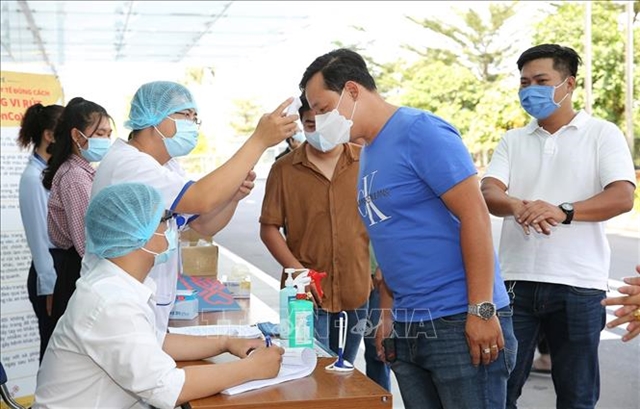 Society
Society

As COVID-19 infections have been reported in the community and hospitals recently, many people have delayed important hospital visits despite their worsening health.

|
| People have temperature checked before entering Gia An 115 Hospital in HCM City. VNA/VNS Photo Đinh Hằng |
HÀ NỘI - As COVID-19 infections have been reported in the community and hospitals recently, many people have delayed important hospital visits despite their worsening health.
Delaying or avoiding essential medical care could put the health of non-COVID-19 patients at risk, doctors have warned.
Associate Professor and Dr Hoàng Bùi Hải, head of the Emergency and Intensive Care Department of Hà Nội Medical University, said an 85-year-old man with chronic obstructive pulmonary disease (COPD) was taken to the hospital after his health declined for about 10 days.
“The patient suffered from breathing difficulty for 10 days. He should have gone to see a doctor as soon as possible but he did not as he and his family were scared of catching COVID-19,” Hải said.
“When the patient was taken to hospital, it was too late as he suffered multi-organ failure,” the doctor said. He died after two days at the hospital.
At the cardiology department of HCM City-based Nhân Dân Gia Định Hospital, an 80-year-old female patient was luckier. She was hospitalised with acute kidney damage and acute liver damage and before that, she had a history of type 2 diabetes and dyslipidemia.
According to the patient's family, seeing the complex development of the COVID-19 pandemic, they delayed taking the patient to the hospital for regular check-ups. Only when the patient had more severe symptoms like difficulty breathing, they rushed to the hospital for emergency treatment, which saved her life.
Late last month, HCM City-based Thủ Đức City Hospital reported two patients who suffered from serious complications due to taking medicine without doctors’ consultations. The two admitted that they were afraid of COVID-19 infections, particularly COVID-19 cases that had been reported in hospitals at that time.
Sharing the same COVID-19 fears, Nguyễn Thị Hoa, of Hà Nội was hesitant to go to the hospital for a regular check after her surgery.
“I had a herniated disc surgery three months ago and now was when the doctor told me to go to the hospital for re-examining,” Hoa said, adding that she was even afraid to use a taxi to go to the hospital.
Doctor Nguyễn Thái Yên from Nhân Dân Gia Định Hospital said during the COVID-19 pandemic, the hospital received many patients whose health problems had worsened but they delayed going to the hospital due to fear of catching coronavirus.
They continued taking medicine doctors prescribed on previous visits or took different kinds of medicine, which could harm their treatment or even their health, he said.
“Despite the resurgence of COVID-19 in the community, patients, especially the elderly with chronic diseases, still need to be periodically re-examined. Some cases must be re-examined on time, otherwise, it will be life-threatening such as heart failure after myocardial infarction, valvular heart disease that has undergone valve replacement surgery, asthma bronchi, chronic obstructive pulmonary disease, hyperthyroidism, epilepsy or peptic ulcer,” he said.
“Hospitals now all have patient screening and classifying systems so that patients with symptoms related to COVID-19 such as fever, cough or shortness of breath are allowed to go to a separate area and be examined in a separate area,” Yên said.
He added that even emergency patients who have not been tested for COVID-19 would be transferred to the emergency room in a separate area and medical workers were equipped with proper protective measures.
Associate Professor and Dr Nguyễn Lân Hiếu, director of Hà Nội Medical University, said before going to a hospital, patients should make a phone call and inform medical workers about their health conditions.
“For those who require emergency care, doctors will advise them to go to the hospital while patients with non-urgent problems will receive remote medical care,” Hiếu said. VNS




